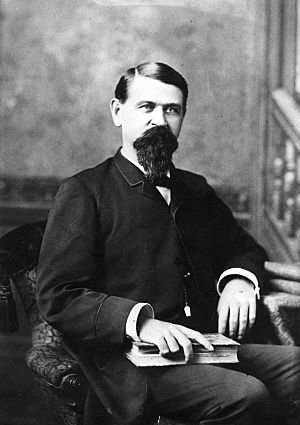George Paul Harrison Jr. facts for kids
Quick facts for kids
George Paul Harrison Jr.
|
|
|---|---|
 |
|
| Member of the U.S. House of Representatives from Alabama's 3rd district |
|
| In office November 6, 1894 – March 3, 1897 |
|
| Preceded by | Charles Pelham |
| Succeeded by | Jeremiah N. Williams |
| President of the Alabama Senate | |
| In office 1882-1884 |
|
| Member of the Alabama Senate | |
| In office 1878-1884 |
|
| Personal details | |
| Born |
George Paul Harrison
March 19, 1841 Savannah, Georgia |
| Died | July 17, 1922 (aged 81) Opelika, Alabama |
| Resting place | Rosemere Cemetery, Opelika, Al |
| Political party | Democratic |
| Signature | |
| Military service | |
| Allegiance | |
| Branch/service | |
| Years of service | 1862–65 |
| Rank | Acting brigadier general (CSA) |
| Battles/wars | American Civil War |
George Paul Harrison (born March 19, 1841 – died July 17, 1922) was an important figure in American history. He served as a U.S. Representative for Alabama. He was also a soldier and a lawyer.
Contents
Early Life and School Days
George Paul Harrison was born on March 19, 1841. His birthplace was "Monteith Plantation," near Savannah, Georgia. As a young man, he went to Effingham Academy. He also studied at the Georgia Military Institute in Marietta, Georgia. His father, also named George Paul Harrison, was a rich farmer and a state lawmaker. His father was also a general in the Georgia militia during the American Civil War.
Military Service in the Civil War
When the American Civil War began in 1861, George Paul Harrison joined the Confederate States Army. He started as a second lieutenant. He helped capture Fort Pulaski. Because of his brave actions, he was made military leader of the Georgia Military Institute. He graduated from there in May 1861.
After graduating, Harrison went back to the army. He was promoted many times. He became a first lieutenant, then a major, and then a colonel. He even became an acting brigadier general. This means he led a large group of soldiers.
In 1862, he became a colonel of the 32nd Georgia Infantry Regiment. He commanded several forts and islands, like Fort Johnson and John's Island. He was wounded twice during these battles. He also helped defend Fort Wagner in 1863.
Harrison led a group of soldiers at the Battle of Olustee. His group helped defeat the Union forces. During this battle, his horse was shot from under him. He was wounded three times during the war.
When he became a brigadier general, he was only 23 years old. This made him one of the youngest generals in the Confederate Army. Later in 1864, Harrison commanded a prison camp in Florence, South Carolina. About 25,000 Union prisoners were held there. The prisoners praised him for treating them kindly. He continued to lead soldiers in other campaigns, including the Carolinas Campaign and the Battle of Bentonville. Even though he acted as a brigadier general, his promotion was not officially confirmed before the war ended.
Law and Political Career
After the Civil War ended in 1865, Harrison moved to Alabama. He began to study law. He also worked as a farmer. He became a lawyer and started his own practice in Auburn, Alabama.
Harrison was involved in Alabama's government. In 1875, he helped write the state's new constitution. He served in the Alabama Senate from 1878 to 1884. He was even the president of the State Senate from 1882 to 1884. In 1892, he was chosen to represent Alabama at the Democratic National Convention.
In 1894, Harrison was elected to the United States House of Representatives. He filled a spot that became open. He was reelected and served in Congress from November 6, 1894, to March 3, 1897.
Later Years and Legacy
After his time in Congress, George Paul Harrison went back to practicing law in Opelika, Alabama. He continued to be involved in state politics. He helped with the State constitutional convention again in 1901. He also served in the Alabama State Senate in 1900 and 1902.
Harrison also worked as a lawyer for railway companies, including the Western Railway of Alabama. He was a major general for the Alabama Division of the United Confederate Veterans.
George Paul Harrison passed away in Opelika, Alabama, on July 17, 1922. He was buried in Rosemere Cemetery.
Images for kids
 | Delilah Pierce |
 | Gordon Parks |
 | Augusta Savage |
 | Charles Ethan Porter |


